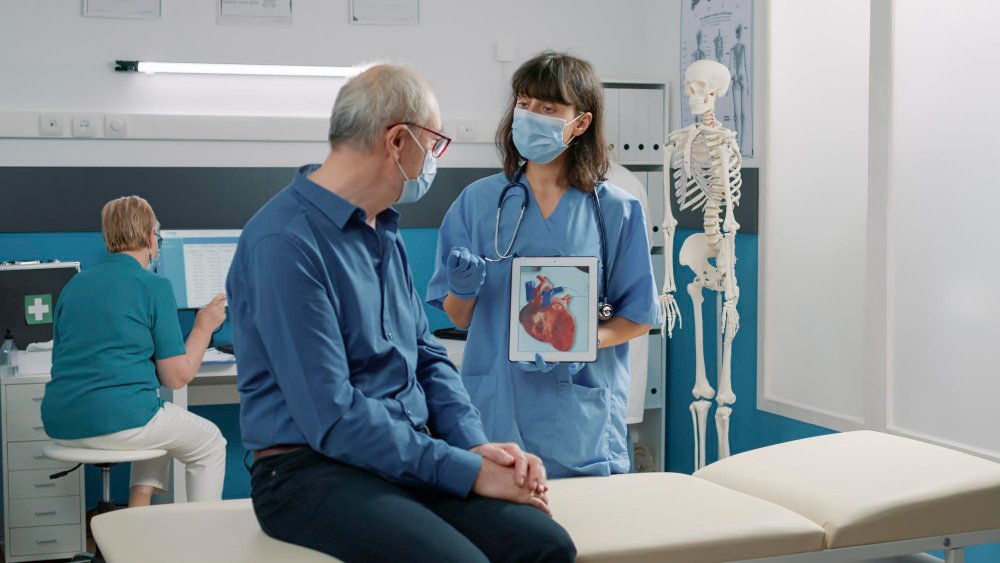Heart problems have rapidly risen to prominence as a major killer of both men and women worldwide. About 17.9 million people die annually from cardiovascular illnesses, according to statistics compiled by the World Health Organization (WHO).
While it is always wise to take precautions, excessive worry and worry over worrying might lead to heart disease symptoms. How can you tell whether your worries are groundless or if you do need to visit a cardiologist? Here are several warning signals that suggest it may be time for a heart check-up.
Pain In The Chest

It is the most prevalent indicator of potential cardiac trouble. Pain, tightness, or pressure in the chest is common symptoms of a heart attack or other condition that causes a blocked artery.
“There is no universal term for that emotion,” Chambers explains. “Many have compared it to feeling like an elephant was perched on their chest. Some have described it as a scorching sensation, while others have compared it to a pinch.” The sensation often does not go away after a few minutes. It may occur while at rest or while engaging in physical activity.
Chambers says it’s probably not your heart if the pain is temporary or it’s at a region that hurts worse when you touch or press on it. Keep in mind that it is possible to have a heart disease or even a heart attack without experiencing any chest discomfort. That’s especially prevalent among females.
Sensations Of Nausea And Abdominal Discomfort
Heart disease symptoms like nausea, indigestion, and heartburn are often signs of gastrointestinal discomfort or malfunction. While chest pain is the early warning signs of heart disease, nausea and indigestion should not be ignored. In cases when nausea or indigestion are accompanied by a feeling that “something is wrong,” but only if they persist, you should see a doctor.
Elevated Blood Pressure That Doesn’t Go Down
The pressure of your blood against the inside of your artery walls is your blood pressure. When arteries are constricted, the heart has to work harder to circulate blood, which raises blood pressure.
Persistently high blood pressure raises the risk of cardiovascular problems like stroke and heart attack because it forces the heart to work harder to pump blood throughout the body. High blood pressure often has no outward signs for quite some time. So, keeping an eye on your BP is crucial.
Your Energy Levels Drop Quickly
Make an appointment with your doctor immediately if you experience unexpected early warning signs of heart disease or breathlessness after doing something you have always found easy, such as ascending the stairs or carrying groceries from the vehicle. Heart disease, particularly in women, may cause extreme fatigue or inexplicable weakness that might last for days.
Inappropriately High Blood Sugar
Diabetes has been related to a variety of cardiovascular illnesses. The risk of getting coronary artery disease increases when blood sugar levels are not controlled. People with diabetes who are concerned about their cardiovascular health should talk to a cardiologist to see what preventative measures or therapies are available to help reduce this risk.
Irritation Of The Legs
Peripheral artery disease (PAD) is a kind of cardiovascular illness characterized by restricted blood flow to the extremities, including a general aching or cramping in the legs (arms and legs).
It is common for the discomfort to flare up during vigorous exercise and fade after rest. Instead of calling your doctor immediately, you may make an appointment and bring up your problems. Cigarette smokers and diabetics are at increased risk for PAD.
Bad Breath
Conditions affecting the gums have also been connected to cardiac issues. Recent studies have shown that bacteria from gum disease may go to the heart, triggering inflammation and infection in blood vessels and heart valves.
Maintain vigilance and make an appointment with a cardiologist immediately if you have any signs of cardiac distress to protect your heart health. Early diagnosis and treatment of heart problems greatly improve patients’ chances of full recovery.
Fatigue

Extreme fatigue is not always indicative of heart problems. Certainly, exhaustion at the end of a hard day on the job is to be expected. Still, if you experience weariness from everyday activities like getting dressed or down a flight of stairs, this might be a sign of a cardiac condition.
Irregular Or Accelerated Heart Rate
Because of the increased demand for oxygen by the working muscles, the heart rate increases during exercise. To a certain extent, that has to be anticipated and falls within normalcy. However, an irregular cardiac rhythm that raises the risk of blood clots and stroke, may cause a speeding pulse even at rest.
Another potentially dangerous heart problems symptom is a heart rate that fluctuates too much from beat to beat. Seek medical assistance if you have symptoms of illness, have experienced more than one skipped, additional, or faster-than-normal heartbeat, or are feeling sick during this period.
Conclusion
One of the essential things you can do to protect your heart health is to learn the warning symptoms of a heart attack or stroke. How fast you get to care for one of these situations determines how well you will be able to recover from it.
In certain cases, the signs of a heart attack might be hard to recognize. If you are worried about the severity of your symptoms, see a doctor immediately. Whether or whether you are experiencing signs of cardiac distress, you must take steps to lower your risk factors. Even if you feel OK, scheduling frequent checks with your doctor is important. A baseline health assessment can make it easier for you and your doctor to handle potential health issues.



